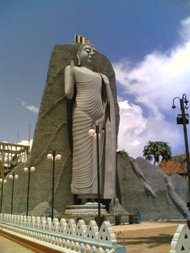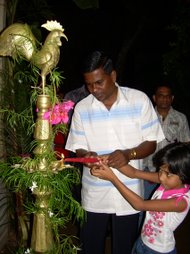Sri Lanka denies civilian crisis-BBC
| The army says it means to "eradicate" the Tamil rebels |
Sri Lanka's government has denied Red Cross and UN reports of a major humanitarian crisis in the north, where troops are fighting Tamil Tiger rebels.
Defence Secretary Gotabhaya Rajapaksa told the BBC that he had a policy of "zero" civilian casualties.
The Red Cross believes that hundreds of civilians have been killed and hundreds of thousands more are trapped.
With aid supplies mostly blocked, the UN plans to make a new bid on Thursday to evacuate badly injured civilians.
It will be the second time in three days that a United Nations convoy, trapped in the town of Puthukkudiyiruppu, will attempt to reach hundreds of critically wounded civilians, including at least 50 seriously injured children, the UN said from Colombo.
It is seeking permission from the Tamil Tigers to cross the front line during a lull in fighting and ferry the injured to Ministry of Health hospitals in Vavuniya that can cope with their wounds.
India has sought assurances that civilians trapped by the fighting in northern Sri Lanka will be protected.
At a meeting, Indian Foreign Minister Pranab Mukherjee urged Sri Lankan President Mahinda Rajapaksa - the defence secretary's brother - to expand "safe zones" for those displaced.
'Exaggeration'
Gotabhaya Rajapakse said both the International Committee of the Red Cross (ICRC) and UN were wrong about the situation in the north.
| INSURGENCY TIMELINE 1976: Liberation Tigers of Tamil Eelam form in the north-east 1987: India deploys peace-keepers to Tamil areas but they leave in 1990 2002: Government and rebels agree ceasefire 2006: Heavy fighting resumes 2009: Army takes main rebel bases of Kilinochchi and Mullaitivu |
He also ruled out any ceasefire for humanitarian reasons, saying it would give the Tigers a chance to reorganise.
"The purpose of this offensive is to eradicate them," he said.
The military say they are involved in a final push against retreating rebels.
Moving north from the captured rebel town of Mullaitivu, they are trying to secure the north-east coastline to encircle the rebels and say they hope to control the entire north within weeks.
The ICRC said earlier that hundreds of civilians had been killed and a quarter of a million people were trapped by the fighting.
The ICRC based its figure of dead on body counts by its staff in local hospitals.
It called on the government troops and rebels to allow immediate and free access to the combat zone for humanitarian workers.
But Sri Lanka's Ministry of Disaster Management and Human Rights said it was the rebels who were preventing the evacuation of civilians, not government forces.
It accused the Tigers of bombarding and killing civilians and suggested the Red Cross suffered from "either wilful ignorance or naivete" when it accused both sides of endangering civilians.





No comments:
Post a Comment